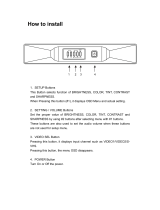
3
Introduction................................................................ 4
Welcome to Toshiba......................................................... 4
Exploring your new TV ................................................... 4
Connecting your TV .................................................. 5
Connecting a VCR .......................................................... 5
Connecting a cable converter box .................................... 6
Connecting a cable converter box and VCR ..................... 6
Connecting a DVD player or satellite receiver and
a VCR .............................................................................. 7
Connecting a DVD player with component video
and a VCR ....................................................................... 8
Connecting a DTV receiver/set-top box with
component video and a VCR ........................................... 9
Connecting two VCRs ................................................... 10
Connecting a camcorder ................................................ 10
Connecting an audio system .......................................... 11
Connecting an A/V receiver ........................................... 11
Using the remote control ...................................... 12
Preparing the remote control for use .............................. 12
Installing the remote control batteries ............................ 12
Remote Control functional key chart ...................... 13
Programming the remote control for use with
your audio/video devices ................................................ 15
Device code setup ................................................... 15
Searching and sampling the code of a device (991) .... 15
Verifying the device code (990) ............................... 16
Using the volume lock feature (993) ....................... 16
Operational feature reset (980) ............................... 16
Device code table ...............................................17-20
Learning about the remote control ................................. 21
Setting up your TV .................................................. 22
Learning about the menu system ................................... 22
Changing the on-screen display language ....................... 23
Selecting the antenna input............................................ 23
Adding channels to the TV’s memory ............................ 24
Programming channels automatically ...................... 24
Adding and erasing channels manually.................... 25
Adjusting the tilt correction feature ................................ 25
Changing channels ........................................................ 26
Using the TV’s features.......................................... 27
Adjusting the channel settings........................................ 27
Switching between two channels ............................. 27
Programming your favorite channels ....................... 27
Labeling channels ................................................... 28
Viewing the wide-screen picture formats ........................ 30
Selecting the image shape........................................ 30
Watching PIP/double-window ....................................... 31
Switching the main and sub-pictures....................... 32
Changing the position of the small picture.............. 32
Freezing the sub-picture .......................................... 32
Using the multi-window feature..................................... 33
Using the favorite function ..................................... 33
Using the strobe function........................................ 33
Using the LOCKS menu ............................................... 34
Entering the PIN code ............................................ 34
Using the V-CHIP menu ............................................... 35
ENABLE BLOCKING .......................................... 35
TV RATING (Independent rating system for
broadcasters) ........................................................... 35
MPAA RATING (Independent rating system for
movies) ................................................................... 36
BLOCKING OPTION.......................................... 36
Unlocking programs temporarily ............................ 37
Locking channels ........................................................... 37
Locking video inputs ..................................................... 38
Using the front panel lock feature .................................. 39
Changing the PIN code ................................................. 39
Adjusting the picture ..................................................... 40
Selecting the picture mode ...................................... 40
Adjusting the picture quality ................................... 40
Saving new preference ............................................. 41
Using the flesh tone feature ..................................... 41
Using the Digital Noise Reduction (DNR) feature ... 41
Selecting the cinema mode...................................... 42
Selecting the color temperature ............................... 42
Resetting picture adjustments ................................. 42
Selecting the video input source ..................................... 43
Labeling the video input sources .................................... 43
Using the closed caption feature..................................... 44
Setting the sleep timer.................................................... 45
Setting the clock ............................................................ 45
Adjusting the sound ....................................................... 46
Muting the sound ................................................... 46
Selecting stereo/SAP broadcasts .............................. 46
Using the WOW™ surround sound feature ........... 47
Adjusting the sound quality .................................... 47
Resetting audio adjustments ................................... 48
Using the sub-woofer system “CYCLONE™” ....... 48
Turning off the built-in speakers ............................. 49
Selecting the Audio OUT sound ............................. 49
Using the StableSound™ feature ............................ 50
Selecting the background of the menu display ............... 50
Displaying on-screen information .................................. 50
Viewing the demonstration mode .................................. 51
Understanding the auto power off feature ...................... 51
Understanding the last mode memory feature ................ 51
Appendix................................................................... 52
Specifications ................................................................. 52
Troubleshooting ............................................................. 53
Limited United States Warranty ..................................... 54
Index .......................................................................... 55

























